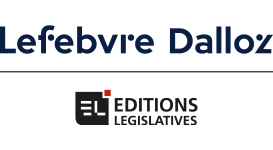What could legal departments in Lithuania, Sweden, Brazil, the USA or Hong-Kong possibly have in common ? An almost generalized, often rushed, shift to remote work. For better or for worse : six legal counsels, from large foreign companies, discuss their observations, the days that keep getting longer, and the efforts they made to limit the impact of telework on their activity.
2020, another brick in the (virtu)wall that keeps rising between people. In the span of a few months, COVID-19 deeply shook our societies, our lifestyles, as well as our work habits. Only a small handful of countries have been spared, and most had to implement measures - more or less drastic - to control the pandemic. Sure, Sweden may not have chosen to handle the pandemic the same way the United States or Brazil have. And yet, they all seem to have something in common : having to witness their companies shift to primarily remote work, whether it had been rendered compulsory by the governments, simply recommended, or imposed by companies themselves.
Six legal counsels, from different parts of the planet, have offered us a virtual tour of their countries. Some of them were already familiar with working from home before the pandemic. They had to adapt quickly at the beginning of the crisis, of course, but it was not too difficult "from a technical perspective", says Simona Grinevičienė, chief legal and procurement officer at Ignitis Grupe, a large Lithuanian energy company. At Arnaud Gouachon’s New-York office - he is the chief legal officer of ContentSquare, a French software company -, it only took a week for everybody to get settled. For some others, who work in traditional companies – like Marcela Coelho, a compliance officer at Ecorodovias, a Brazilian highway company –, getting used to working from home was a challenge. Now that several months have passed, all six of them are able to put things into perspective, and reflect on the pros and cons of remote work.
Each one of them could paint a different positive facet of remote work. Arnaud Gouachon enjoys the flexibility it offers. Conversely, Matt, a senior associate in a Japanese law firm who is temporarily assigned in Hong-Kong, noted an increased sense of commitment to the company. More precisely, he describes an "all hands-on deck" feeling among employee, who have been working extra hard to come together and navigate through these unprecedented times. However, if there is one major advantage to be highlighted, it should be this one : being able to focus with ease, as there is much less distraction around. In that regard, remote work is a strong asset.
Simona Grinevičienė notes that all the written and administrative aspects of her job is much easier when done at home. Marcela Coelho feels more productive. Simply stated, "some things are much easier", according to Caroline Falconer, legal counsel at Vattenfall, a Swedish company. She gets more time to concentrate. It makes sense, of course : in the office, "people would come and interrupt quite often", states Matt.
Every legal counsel perceives the effectiveness of remote work in their own respective way. However, regarding the way things are handled within legal departments, one thing is worth exploring : does working from home make the job harder ? It appears that it does not, to some extent. Alya Bloum, legal counsel at the Lithuanian offices of Vinted, assures that his team "has proven, over the past 8 months, that they were able to follow through and keep the legal work going".
Caroline Falconer concedes that remote work might be a difficulty for new projects, which are easier to materialize when people can meet in-person. Other than that, it goes smoothly with ongoing projects, where everyone already knows each other.
On his part, Arnaud Gouachon acknowledges that remote work might have made it more complex to offer a full support to sales representatives : it is always best to meet with them physically, rather than setting up a zoom meeting every time when something needs to be discussed. Even more so because as Arnaud Gouachon points out, "legal counsels need to be a part of the company’s life". Remote work has affected communication with other departments, which means that when his team finally is solicited, it might already be too late.
However, if internal communication has been troubled and slowed down, external exchanges have not. The explanation is quite logical : most of the counsels were already used to working with people located in various countries, due to them working for such large companies. It is no surprise that they did not find it necessarily harder to handle things within their legal departments, because they already had tools to do their job in a virtual manner. Regardless, "nothing beats meeting someone in person", concludes Caroline Falconer.
There are the pros… just like there are cons. Certainly, remote work has brought more flexibility and created a favourable climate for concentration. However, the downside of having work invading our homes is pernicious, in which the line between work hours and personal life gets more and more fuzzy. Matt regrets that he "never has the satisfaction of being able to shut off". Same with Simona Grinevičienė, who admits that working hours are longer, and that it is becoming quite difficult to put an end to work time.
Overall, all agree on the fact that it is not easy to find a new rhythm at home, when work invades their private spaces. As a result, "when you are at home, you do not see time go by… and all of the sudden, it is 11pm and you are still working", confides Marcela Coelho. Simona Grinevičienė has a few tips to share to better separate working from home from being at home : one of her colleagues wears the pair of shoes she would normally wear at the office, even when working from home. Once she takes them off, work is over. And for parents who also need to share their home office with their children ? Put some lipstick on. That is the idea another one of her colleagues came up with to help her children understand what she is doing : when she is wearing lipstick, it means she is working.
Regarless, the paradox is real : despite working from the comfort of their homes, and avoiding commute time, people get more tired. As Matt admits, companies "don't have the capacity to sit around and think about ways we could make things more efficient : we just try to get it all done the best way we know how".
|
What is it like, in their countries ?
|
|---|
Gestion d'entreprise
La gestion d’entreprise constitue l’essentiel de l’activité d’un dirigeant d’entreprise. Elle fait appel à un grand nombre de notions empruntées de la comptabilité, de la finance (gestion des risques au moyen de la gestion des actifs et des assurances professionnelles), du droit des affaires (statut juridique, contrats commerciaux, fiscalité, cadre réglementaire et légal de l’activité), de la gestion de ressources humaines...
Nos engagements
La meilleure actualisation du marché.
Un accompagnement gratuit de qualité.
Un éditeur de référence depuis 1947.
Des moyens de paiement adaptés et sécurisés.



![From one ocean to the other, the new virtual life of legal counsels [1]](https://www.editions-legislatives.fr/media/news-npa/resized/650/610519-adobestock_342077354.jpeg)





